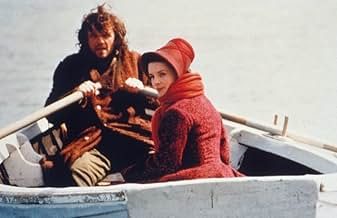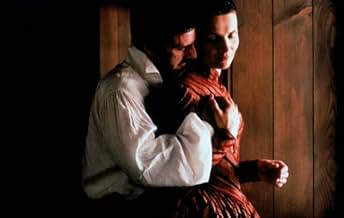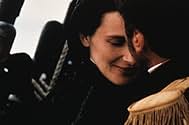VALUTAZIONE IMDb
7,1/10
5816
LA TUA VALUTAZIONE
Aggiungi una trama nella tua linguaIn a small French colony, a drunken man kills someone. While a guillotine is being shipped in, he changes, becoming a good and popular man.In a small French colony, a drunken man kills someone. While a guillotine is being shipped in, he changes, becoming a good and popular man.In a small French colony, a drunken man kills someone. While a guillotine is being shipped in, he changes, becoming a good and popular man.
- Regia
- Sceneggiatura
- Star
- Premi
- 3 vittorie e 9 candidature totali
Recensioni in evidenza
You have to watch the odd foreign film such as this to understand just how far Hollywood has strayed from cinematic honesty. This is a simple, beautifully done, superbly acted piece of theatre set in one of the world's least known places, the fog shrouded French island of St. Pierre, off Newfoundland. It's a simple yet gripping film with an intriguing plot, almost a morality play. There is visceral human drama, much mystery and wonderful soul stirring pathos. And how nice to see a movie without the mandatory Hollywood happy ending. A well spent evening!
THE WIDOW OF ST.-PIERRE may not be a great film, but amidst a crop of mediocre current releases, it's a fine effort that boasts a hardworking cast, awesome costumes and sets, terrific cinematography and excellent direction. For those unlikely to stay in and read MOBY DICK, the combination of austere location, mid-19th-century maritime theme, and the Reaper looming o'er the ocean tides offers a satisfying divertissement on a cloudy Sunday afternoon.
Based on actual court records, the plot begins after a Parisian military captain, Jean (Daniel Auteuil), and his new wife, Madame La (Juliette Binoche), arrive on an isolated French isle off the coast of Newfoundland, where widows outnumber balmy days 50 to 1. One night, two blind-drunk men brutally knife a man to find out if he's `fat or just big.' The court sentences instigator Neel Auguste (Yugoslav director Emir Kusturica) to death by guillotine, `the widow,' in French parlance. But the remote fishing island does not possess the instrument of destruction that its French rulers dictate and must obtain a loaner from Martinique. While awaiting its arrival, the government locks Neel in a dark cell and entrusts him to the care of the Captain and Madame La.
An MSW waiting to happen, Madame has a weakness for `desperate cases.' She asks Neel to build her a greenhouse and tend her plants, a challenging request in this hardscrabble environment. As the Parisian belle negotiates her homesickness and the austerity of her surroundings by cultivating her garden, Neel confronts his own banishment from society and cultivates his compassion. This is one of several lovely parallelisms director Patrice Leconte teases out.
The sexual tension between Madame and Neel, though enacted subtly, is nevertheless palpable. During a reading lesson, their fingers brush while scanning a page. As Neel scarfs down her soup in a mildly bestial manner, she looks on lovingly. And when he asks her why she so nurtures him, she replies, `We change, whatever we do. I am sure of that.'
Meanwhile, the fisherfolks' tongues are wagging-ever cautioning Madame's loving husband about the duo's blossoming relationship. The Captain, however, venerates his wife's `humanism' and trusts her enough not to interfere. He is another wonderful character, both strong and sensitive, passionate in his love of his wife, unwilling to back down in his defense of their collective ideals.
Both Binoche and Kusturica prove more than equal to their roles. Binoche imbues her character with much more depth than that of Vianne in CHOCOLAT. With her limpid brown eyes and achingly empathic face, she elevates this personage to the level of classic tragic heroine. Kusturica, given a part that begs overacting, never wrings out our emotions, yet shows he possesses true remorse for his actions and a heart kinder still than that of his benefactors.
Most memorable is the set. Shot in Nova Scotia and Quebec, the film uses clapboard and stone buildings, often snow-salted, as an apt metaphor for the government's rigidity in refusing to commute Neel's sentence, despite his overwhelming popularity in the village as a doer of good deeds. Clearly the film excoriates capital punishment, with such dialogue as Madame's fervent cry, `They aren't punishing the same man they sentenced!'
This widow's walk proceeds at a leisurely pace, perhaps a mite too slowly for 21st-century attention spans. But overall, if you like a good, dark tragedy, pick a dreary night and go.
Based on actual court records, the plot begins after a Parisian military captain, Jean (Daniel Auteuil), and his new wife, Madame La (Juliette Binoche), arrive on an isolated French isle off the coast of Newfoundland, where widows outnumber balmy days 50 to 1. One night, two blind-drunk men brutally knife a man to find out if he's `fat or just big.' The court sentences instigator Neel Auguste (Yugoslav director Emir Kusturica) to death by guillotine, `the widow,' in French parlance. But the remote fishing island does not possess the instrument of destruction that its French rulers dictate and must obtain a loaner from Martinique. While awaiting its arrival, the government locks Neel in a dark cell and entrusts him to the care of the Captain and Madame La.
An MSW waiting to happen, Madame has a weakness for `desperate cases.' She asks Neel to build her a greenhouse and tend her plants, a challenging request in this hardscrabble environment. As the Parisian belle negotiates her homesickness and the austerity of her surroundings by cultivating her garden, Neel confronts his own banishment from society and cultivates his compassion. This is one of several lovely parallelisms director Patrice Leconte teases out.
The sexual tension between Madame and Neel, though enacted subtly, is nevertheless palpable. During a reading lesson, their fingers brush while scanning a page. As Neel scarfs down her soup in a mildly bestial manner, she looks on lovingly. And when he asks her why she so nurtures him, she replies, `We change, whatever we do. I am sure of that.'
Meanwhile, the fisherfolks' tongues are wagging-ever cautioning Madame's loving husband about the duo's blossoming relationship. The Captain, however, venerates his wife's `humanism' and trusts her enough not to interfere. He is another wonderful character, both strong and sensitive, passionate in his love of his wife, unwilling to back down in his defense of their collective ideals.
Both Binoche and Kusturica prove more than equal to their roles. Binoche imbues her character with much more depth than that of Vianne in CHOCOLAT. With her limpid brown eyes and achingly empathic face, she elevates this personage to the level of classic tragic heroine. Kusturica, given a part that begs overacting, never wrings out our emotions, yet shows he possesses true remorse for his actions and a heart kinder still than that of his benefactors.
Most memorable is the set. Shot in Nova Scotia and Quebec, the film uses clapboard and stone buildings, often snow-salted, as an apt metaphor for the government's rigidity in refusing to commute Neel's sentence, despite his overwhelming popularity in the village as a doer of good deeds. Clearly the film excoriates capital punishment, with such dialogue as Madame's fervent cry, `They aren't punishing the same man they sentenced!'
This widow's walk proceeds at a leisurely pace, perhaps a mite too slowly for 21st-century attention spans. But overall, if you like a good, dark tragedy, pick a dreary night and go.
I was most impressed with the visual language of this movie that does not waste words to show emotions. The tensions are well reflected in the play of the actors, whose gestures, shrugs and smiles say more than a thousand lines.
Another interesting feature of the movie is that it does not follow the easy path of romance that is "expected" by the public. In turn, it exposes a world which is cruel, unfair, where justice is determined by personal interests and where those who fight the system are seen as mad and excluded from the "high society".
It is a movie about the determination to fight for something one believes in!
Another interesting feature of the movie is that it does not follow the easy path of romance that is "expected" by the public. In turn, it exposes a world which is cruel, unfair, where justice is determined by personal interests and where those who fight the system are seen as mad and excluded from the "high society".
It is a movie about the determination to fight for something one believes in!
The actions of two men on a drunken spree turns out to be fatal for the man who is being harassed because he dies as a consequence of a fight with his two tormentors. Both men are apprehended and condemned to die as punishment for their actions. The way to die is beheading by guillotine, or "the widow" in the vernacular.
Thus begins this story that director Patrice Leconte directed, based on the screen play by Claude Faraldo. The story is set in the remote island of Saint Pierre, off the coast of Newfoundland. This is a hostile environment settled by the French. Saint Pierre boasts a lot of widows who have survived the rigors of the climate and the hard lives their husbands led.
Into this milieu we find a military captain and his wife. Both are Parisians and appear to be compassionate, at heart. When Neel, the surviving drunk is brought to be kept in a cell within the military quarters of the island, the wife, Madame La, takes an interest in the man. With her husband's consent, she asks for his help in tending a green house in the premises and other errands.
Neel and Madame La are at simple view, just opposites. The kindness Neel sees in her, transforms him. Madame La even goes to help him learn to read. All these actions don't sit well with the rest of the inhabitants and the people in the government who demand a guillotine is sent over and have him execute the prisoner.
The film works because the brilliant performance of Juliette Binoche, who as Madame La, makes her mark in the picture. Her compassion for Neel is genuine; in her heart she believes this man, a product of the environment in which he was born, shows qualities that no one has seen in him.
Emir Kusturica, a noted film director himself, is also one of the assets of the movie. Mr. Kusturica is a large man with unkempt looks, who is totally believable as Neel. His interaction with Madame La turns from gratitude into a noble love that is not meant to be.
The other principal is Daniel Auteuil who is perfect as the captain, the husband of Madame La, who is outraged by what he perceives to be the wrong punishment for the accused Neel. In spite of the menacing presence of Neel next to his wife, he trusts her as he knows her kind heart belongs to him only.
"La veuve de Saint Pierre" is a great movie that will satisfy viewers in search of a different story. Patrice Leconte has directed with panache as he takes us to see the beauty of Saint Pierre, something that is so bleak, yet it's a place that has a magnetic attraction as we watch the film unfold.
Thus begins this story that director Patrice Leconte directed, based on the screen play by Claude Faraldo. The story is set in the remote island of Saint Pierre, off the coast of Newfoundland. This is a hostile environment settled by the French. Saint Pierre boasts a lot of widows who have survived the rigors of the climate and the hard lives their husbands led.
Into this milieu we find a military captain and his wife. Both are Parisians and appear to be compassionate, at heart. When Neel, the surviving drunk is brought to be kept in a cell within the military quarters of the island, the wife, Madame La, takes an interest in the man. With her husband's consent, she asks for his help in tending a green house in the premises and other errands.
Neel and Madame La are at simple view, just opposites. The kindness Neel sees in her, transforms him. Madame La even goes to help him learn to read. All these actions don't sit well with the rest of the inhabitants and the people in the government who demand a guillotine is sent over and have him execute the prisoner.
The film works because the brilliant performance of Juliette Binoche, who as Madame La, makes her mark in the picture. Her compassion for Neel is genuine; in her heart she believes this man, a product of the environment in which he was born, shows qualities that no one has seen in him.
Emir Kusturica, a noted film director himself, is also one of the assets of the movie. Mr. Kusturica is a large man with unkempt looks, who is totally believable as Neel. His interaction with Madame La turns from gratitude into a noble love that is not meant to be.
The other principal is Daniel Auteuil who is perfect as the captain, the husband of Madame La, who is outraged by what he perceives to be the wrong punishment for the accused Neel. In spite of the menacing presence of Neel next to his wife, he trusts her as he knows her kind heart belongs to him only.
"La veuve de Saint Pierre" is a great movie that will satisfy viewers in search of a different story. Patrice Leconte has directed with panache as he takes us to see the beauty of Saint Pierre, something that is so bleak, yet it's a place that has a magnetic attraction as we watch the film unfold.
In 1849, in the Archipelago of Saint-Pierre et Miquelon, the drunken Ariel Neel Auguste (Emir Kusturica) and his partner Louis Ollivier (Reynald Bouchard) kill for a futile motive (to see if he is fat or just big) the fishing boat captain Coupard (Michel Daigle). Nell, who stabbed the victim, is sentenced to die with his head severed in the guillotine while Louis is sentenced to hard labor. During the transportation to the prison under the custody of Captain Jean (Daniel Auteuil), there is an accident and Louis dies. While spending his days in the cell waiting for the guillotine and the executioner, Neel is invited by the captain's wife Mrs. Pauline (Juliette Binoche) to help her in her garden and becomes her protégé. Later he has a process of rehabilitation helping the locals in minor works and becomes very popular in the island. When he saves the building Café du Nord and her owner from sinking in the sea, his popularity increases and nobody but the governor and politicians of the council wants his death. Neel marries Eleontine Jeanne-Marie, but sooner he is informed that the ship Marie Galante has just left Martinique bringing a guillotine. Now the Governor and politicians need to find an executioner in the population to execute the sentence.
"La Veuve de Saint-Pierre" is a beautiful dramatization of a story of rehabilitation and intolerance. I do not know whether this event is partially true or not – there are references in Internet to this story but in sites that I can not trust – but this movie is wonderful. The story and screenplay are engaging and very well written with powerful lines; the direction of Patrice Leconte and the performances are top- notch, with Juliette Binoche extremely beautiful and elegant as usual and showing a magnificent chemistry with Daniel Auteuil; the cinematography and costumes are wonderful. Based on my adjectives, it is unnecessary to say that I loved this movie. My vote is eight.
Title (Brazil): "A Viúva de Saint-Pierre" ("The Widow of Saint-Pierre")
"La Veuve de Saint-Pierre" is a beautiful dramatization of a story of rehabilitation and intolerance. I do not know whether this event is partially true or not – there are references in Internet to this story but in sites that I can not trust – but this movie is wonderful. The story and screenplay are engaging and very well written with powerful lines; the direction of Patrice Leconte and the performances are top- notch, with Juliette Binoche extremely beautiful and elegant as usual and showing a magnificent chemistry with Daniel Auteuil; the cinematography and costumes are wonderful. Based on my adjectives, it is unnecessary to say that I loved this movie. My vote is eight.
Title (Brazil): "A Viúva de Saint-Pierre" ("The Widow of Saint-Pierre")
Lo sapevi?
- QuizThe film was to be completely filmed on the island of Saint-Pierre, but when the snow failed to arrive, the production had to move further north to Newfoundland for certain sequences.
- BlooperWhen Neel is told he's strong enough to "ramer jusqu'au chez les Anglais", the English subtitles say "row over to Canada" rather than "row over to the English". This introduces an error: both the geography and the dialogue in other scenes make it clear that Newfoundland is meant, but Newfoundland wasn't part of Canada until 1949.
- ConnessioniFeatured in The 58th Annual Golden Globe Awards 2001 (2001)
I più visti
Accedi per valutare e creare un elenco di titoli salvati per ottenere consigli personalizzati
- How long is Widow of St. Pierre?Powered by Alexa
Dettagli
- Data di uscita
- Paesi di origine
- Sito ufficiale
- Lingua
- Celebre anche come
- Widow of St. Pierre
- Luoghi delle riprese
- Fortress of Louisbourg, Louisbourg, Nuova Scozia, Canada(as Saint-Pierre)
- Aziende produttrici
- Vedi altri crediti dell’azienda su IMDbPro
Botteghino
- Budget
- 100.000.000 FRF (previsto)
- Lordo Stati Uniti e Canada
- 3.193.889 USD
- Fine settimana di apertura Stati Uniti e Canada
- 31.702 USD
- 4 mar 2001
- Lordo in tutto il mondo
- 7.193.889 USD
- Tempo di esecuzione1 ora 52 minuti
- Colore
- Mix di suoni
- Proporzioni
- 2.35 : 1
Contribuisci a questa pagina
Suggerisci una modifica o aggiungi i contenuti mancanti

Divario superiore
By what name was L'amore che non muore (2000) officially released in India in English?
Rispondi































